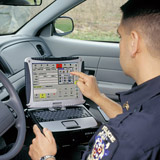Well I officially have a new favorite show. This is the first time I've found zombies frightening since I first watched Night of the Living Dead.
Earlier in the thread someone asked why zombies don't attack each other. In several of the books related to the genre it was always suggested that it was because of the smell that zombies gave off. Others suggested that it was because of phereomones given off by living humans.
The reason zombies don't attack one another is because their bodies are biologically inactive and composed of dead, rotting and corrupted tissue and therefore lacking in the ability to provide the undead with the energy needs they desire. Though their bodies don't require food for survival, but they crave energy (i.e. "food") on an instinctive level.
The mechanism by which they became reanimated is low-powered and incomplete; which is why they move slowly and are relatively weaker than living humans. Their systems recognize their physiology is underpowered compared to what it is designed for and so they naturally crave the energy of the much high metabolic systems of living humans. Their primitive brain mis-translates this low-powered state and desire for more energy as a form of intense "hunger" and manifests as a solution a severe craving for the much more energetic, biochemically powered metabolism of the living humans. And, of course, in life the "undead" gained energy from the environment just as we all do, from eating. Therefore, the zombie's instinctive solution to solving the energy issues of its own low-powered, "starving" metabolism is by trying to obtain the energy of the biochemically powered metabolism of living humans by eating them. Of course, it doesn't work because you basically have a NEW mechanism functioning which reanimates the dead on a cellular level but their organ-based biological systems are inoperative and thus the "hunger" is never abated. BTW, the means by which humans (and all other known creatures) are defined as "living" and the mechanism by which the zombies are reanimated are mutually incompatible. They are NOT "alive" by any known medical or scientific definition as the means by which they are reanimated is not biochemical in nature and the function of their bodies is not organ-based. In the zombie, you have a creature which is being "powered" by a process its body never evolved to handle; which results in a lot of mis-communication and mixed signals within the system.
Incidentally, the lack of intelligence, awareness and general "personality" of the zombie is not a failure of the reanimation process but a consequence of the physical destruction of neurons of the brain which occurs in the relatively narrow window between the "death" of the living human and the "reanimation" of the undead zombie. The neurons of the brain, mostly lacking in glycogen, reserves are physically disrupted by the hypoxic/anoxic conditions in the brain that occur following the cessation of heart/respiratory functions and prior to the actual mechanism of reanimation. Higher brain functions, and therefore intellect, personality and self-awareness, are essentially destroyed at this time and do not recover following reanimation due to the physical disruption/destruction of the neural network of the brain.
It is possible, BTW, in rare instances where, for one reason or another, reanimation occurred more quickly than usual or if the body was very cold thereby limiting the physical damage to the brain, the reanimated specimen might exhibit some slightly higher quality of mental function or intelligence and display some dim familiarity with or memory of locations, people or objects. Some may even engage in habitual rote-memory behaviors they performed in life, but this is essentially reflexive and not conscious activity.


